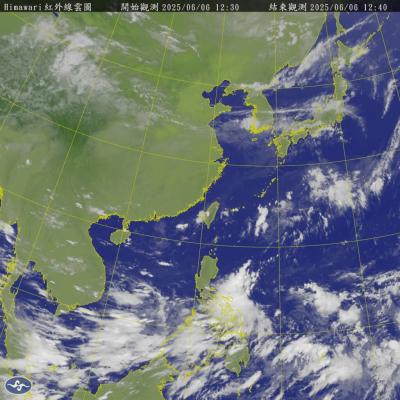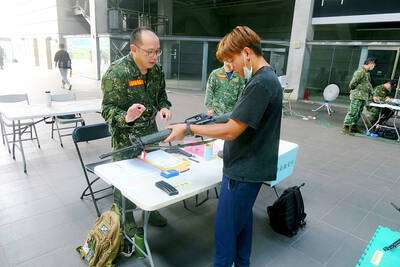China’s top negotiator to Taiwan may call Taiwan an equal partner, but after his five-day visit it is clearer than ever its fate is being dictated by its giant neighbor, analysts said yesterday.
This is putting President Ma Ying-jeou’s (馬英九) Beijing-friendly government in an extremely difficult position because only a minority of Taiwanese are comfortable with the idea of unification in the foreseeable term.
“China’s rise is faster than expected, and the changes in international situation are speeding up,” said Liu Bih-rong (劉必榮), an expert on Taiwan-China ties and a political science professor at Soochow University. “Taiwan simply can’t keep asking more without making any compromises.”
Ma took office in May last year promising improved relations with China and a better local economy, and Association for Relations Across the Taiwan Strait Chairman Chen Yunlin’s (陳雲林) visit, which ended yesterday, is the latest sign of rapprochement.
“These talks will help increase mutual trust between the two sides and boost the people’s support,” Straits Exchange Foundation Deputy Chairman Maa Shaw-chang (馬紹章) said. “Therefore, it has helped pave the way for the next round of negotiations in the mainland.”
The negotiations are crucial not just to Beijing and Taipei, but to the region as a whole, since the situation around the Taiwan Strait is one of the last remnants of the Cold War in Asia.
Chen on Monday hailed a series of agreements the two sides have reached in talks “on an equal footing” during Ma’s 19 months in charge.
Three more deals were signed on Tuesday— on food quarantine, industrial standards and fishing crews — but they will be dwarfed by a sweeping trade pact Ma hopes to sign with China next year, arguing it will boost employment.
However, it is likely that China will want its share of benefits from the proposed deal, known as the economic cooperation framework agreement (ECFA).
“Taiwan is anxious to sign the ECFA, and Taiwan wants to profit from the ECFA, but so does China,” Liu said.
China holds all the cards, given its enormous superiority, with an economy 11 times larger than Taiwan’s, and 58 times as many people.
Basic comparisons of the respective strengths of China and Taiwan — and a simple look at the map — reveal just how weak and exposed Taiwan is.
What is more, China is not content with just economic cooperation, as it repeats as often as it can its ambition of eventually taking over Taiwan politically, militarily and culturally.
“China’s eventual goal is to unify with Taiwan, and China wants to facilitate unification through promoting economic integration with Taiwan,” said Tung Chen-yuan (童振源), a political scientist at National Chengchi University. “But polls show that more Taiwanese lean toward independence than unification despite the economic reliance on China.”
This has heightened public suspicions about the ECFA and could pose a challenge for Ma in securing backing for the deal, analysts said.
It does not help that the public feels left in the dark about the trade pact in the absence of clear details from the government, said Shaw Chong-hai (邵宗海), a political science professor at Chinese Culture University.
“The government has not done enough. That’s why the opposition has been able to stage strong protests against the talks,” he said.

STAY AWAY: An official said people should avoid disturbing snakes, as most do not actively attack humans, but would react defensively if threatened Taitung County authorities yesterday urged the public to stay vigilant and avoid disturbing snakes in the wild, following five reported snakebite cases in the county so far this year. Taitung County Fire Department secretary Lin Chien-cheng (林建誠) said two of the cases were in Donghe Township (東河) and involved the Taiwan habus, one person was bit by a Chinese pit viper near the South Link Railway and the remaining two were caused by unidentified snakes. He advised residents near fields to be cautious of snakes hiding in shady indoor areas, especially when entering or leaving their homes at night. In case of a

A tropical disturbance off the southeastern coast of the Philippines might become the first typhoon of the western Pacific typhoon season, the Central Weather Administration (CWA) said. The system lacks a visible center and how it would develop is only likely to become clear on Sunday or Monday, the CWA said, adding that it was not yet possible to forecast the potential typhoon's effect on Taiwan. The American Meteorological Society defines a tropical disturbance as a system made up of showers and thunderstorms that lasts for at least 24 hours and does not have closed wind circulation.

ENERGY RESILIENCE: Although Alaska is open for investments, Taiwan is sourcing its gas from the Middle East, and the sea routes carry risks, Ho Cheng-hui said US government officials’ high-profile reception of a Taiwanese representative at the Alaska Sustainable Energy Conference indicated the emergence of an Indo-Pacific energy resilience alliance, an academic said. Presidential Office Secretary-General Pan Men-an (潘孟安) attended the conference in Alaska on Thursday last week at the invitation of the US government. Pan visited oil and gas facilities with senior US officials, including US Secretary of the Interior Doug Burgum, US Secretary of Energy Chris Wright, Alaska Governor Mike Dunleavy and US Senator Daniel Sullivan. Pan attending the conference on behalf of President William Lai (賴清德) shows a significant elevation in diplomatic representation,

The Taipei City Reserve Command yesterday initiated its first-ever 14-day recall of some of the city’s civilian service reservists, who are to undergo additional training on top of refresher courses. The command said that it rented sites in Neihu District (內湖), including the Taipei Tennis Center, for the duration of the camp to optimize tactical positioning and accommodate the size of the battalion of reservists. A battalion is made up of four companies of more than 200 reservists each, it said. Aside from shooting drills at a range in New Taipei City’s Linkou District (林口), the remainder of the training would be at